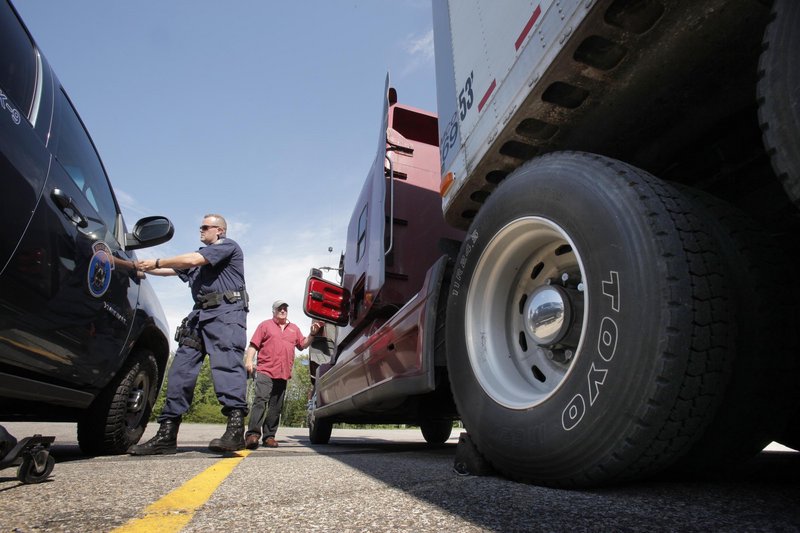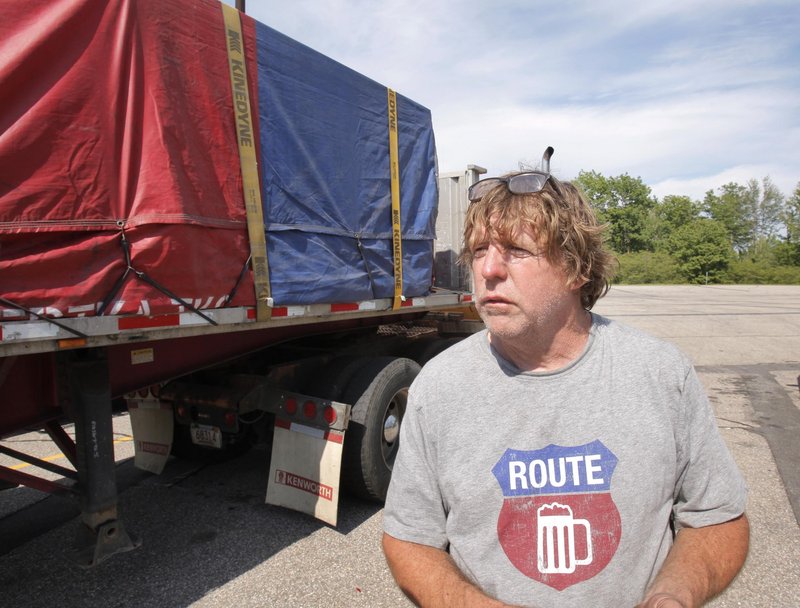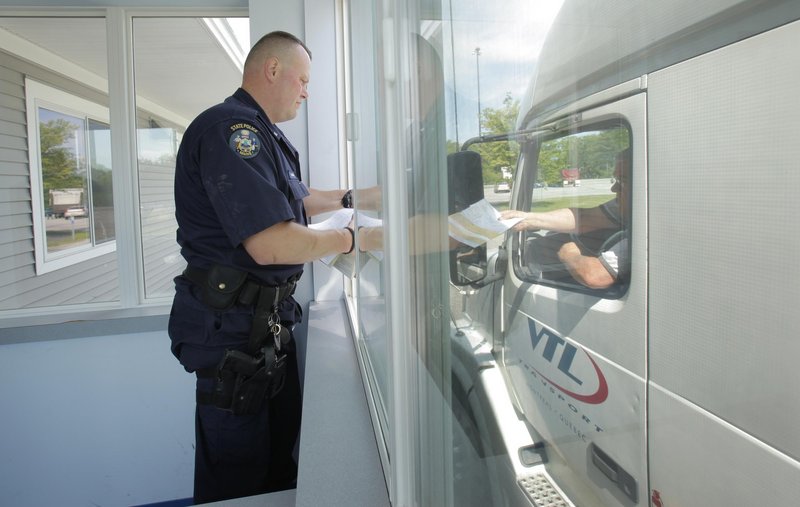Hank Wilbur, a Massachusetts truck driver, was beside himself with frustration Tuesday when a state police inspection disclosed that the hours listed on his driving log failed to correspond with McDonald’s receipts he had kept as supporting documentation.
“When I get tired, I pull over and go to sleep in the sleeper for a one-hour power nap and then I can drive another eight hours,” Wilbur said.
Wilbur was forced to hire a tow truck to haul his rig and its load of scrap metal back to a truck stop in Greenland, N.H., where he would have to wait the required 10 rest hours before continuing to Auburn.
Wilbur was one of several drivers ordered off the road Tuesday in the first of three days of Roadcheck 2011, a truck enforcement effort taking place nationally and in Canada and Mexico.
Members of the Maine State Police commercial vehicle enforcement unit, aided by other troopers, were at the northbound weigh station on Interstate 95 in York doing truck inspections, which range from paperwork – license, registration, logbook and manifests – to a thorough mechanical check.
“There’s good (drivers) and bad ones,” said Lt. Thomas Kelly, head of the commercial vehicle enforcement unit. “Most of the drivers are very professional and the carriers are very professional. Sometimes the economy may get in the way. When they cut corners, safety takes a back seat.”
Some infractions are relatively minor. Trooper Shane Northrup’s inspection of one rig disclosed that an antilock braking system light was on, indicating the system was not working properly. The driver was allowed to complete his run, but must fix it before his next one.
Some are more serious, such as the steering mechanism he saw that could let go in a turn and cause a serious accident, Northrup said.
Drivers can drive 11 hours before taking a 10-hour break. Exceeding that can result in a $311 fine, but falsifying a logbook – lying about the number of hours driven – is a $911 fine, he said.
John Lannen, executive director of the Truck Safety Coalition, said there are pros and cons to the annual enforcement effort.
“Since it is pre-announced, it’s not clear it’s as effective as it would be if it was unannounced,” Lannen said.
“It’s disconcerting, the high percentage (taken out of service) they will get for trucks or the driver, even when it is pre-announced,” he said. “Imagine what it is if it was not announced.”
Lannen said the sluggish economy has driven some smaller operators out of business, and many of those who remain are more experienced. He suspects that is why truck-crash fatalities dropped from about 5,000 per year for most of the past decade to a little more than 4,000 per year for the past three years.
That’s still a lot, though, he said.
“Trucks are 80,000 pounds or more, and you have cars that are small and getting smaller,” he said.
Wilbur, who has been driving trucks for 20 years, says it’s harder to make a living today. At $4.25 a gallon, he can seldom afford to fill both of his 150-gallon diesel tanks, and a New York City bridge toll that used to cost $4 now costs $40.
Kelly said that only about 18 percent of violations lead to summonses, but all go on a driver’s record or that of the carrier. A national database keeps track of infractions, and the results can affect insurance costs.
Kelly said roughly 15 percent of trucks inspected are taken out of service because the truck or driver is unsafe.
“Taking a driver off the road who’s been driving for three days straight – those are lives saved,” he said.
Noe Echeverria of McAllen, Texas, said driving big rigs pays well, regardless of the economy. He was in Maine to pick up a load of bottled water headed for Illinois. He took Tuesday’s inspection in stride.
“They are making sure the commercial vehicles are in perfect condition,” he said. “If I was one of those drivers that does not keep the logbook, then you take chances and you get caught. You know ahead of time something is going to happen.”
As it turns out, Echeverria also had discrepancies in his logbook and was ordered off the road till 1:35 this morning.
As his rig was maneuvered onto a large tow truck, he said he wasn’t bitter. “That’s part of the business,” he said with a smile.
Staff Writer David Hench can be contacted at 791-6327 or at: dhench@pressherald.com
Send questions/comments to the editors.





Success. Please wait for the page to reload. If the page does not reload within 5 seconds, please refresh the page.
Enter your email and password to access comments.
Hi, to comment on stories you must . This profile is in addition to your subscription and website login.
Already have a commenting profile? .
Invalid username/password.
Please check your email to confirm and complete your registration.
Only subscribers are eligible to post comments. Please subscribe or login first for digital access. Here’s why.
Use the form below to reset your password. When you've submitted your account email, we will send an email with a reset code.